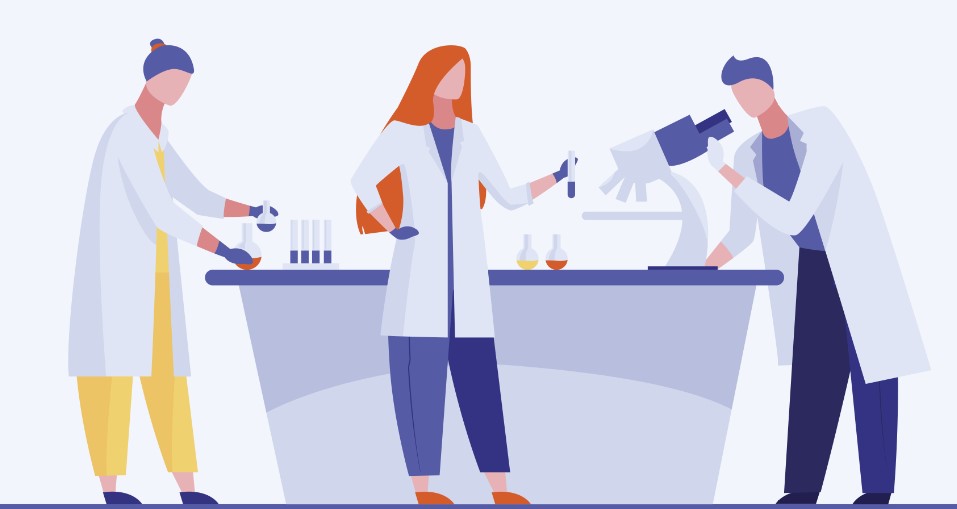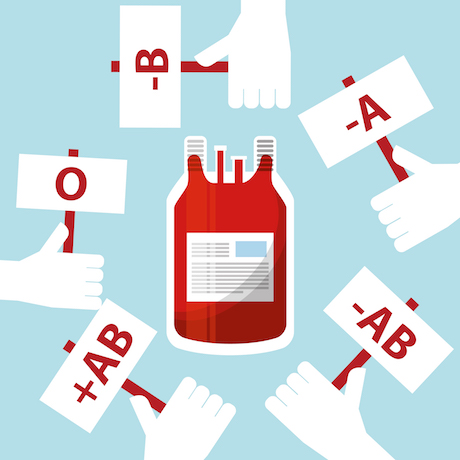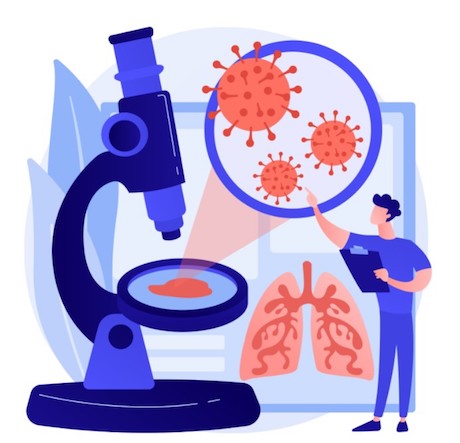
By Dr. Brandon Colby MD, a medical expert specializing in personalized preventive medicine and clinical genomics.
The global pandemic that has stopped people in their tracks has led to great strides in genomics. As we learn more about the virus and how genes and blood type play a role, we're becoming much more knowledgable about how to decrease the risk and severity of COVID-19.
Overview of Blood Type and COVID Research
People who have blood type O are less likely to become infected with COVID-19 and those with blood types A and AB may be at increased risk of suffering from severe coronavirus-related illnesses.
The above findings were published in Blood Advances on October 14, 2020. In addition to individuals with blood type O having a lower risk of infection, the two studies reported on in the journal also found the outcomes were less severe compared to people with other blood types.
Type O Blood Group
In a retrospective study, researchers looked at Danish health registry data from over 473,000 people who were tested for COVID-19 infection in Denmark. They compared them to over 2.2 million people from the general population. Out of all the positive results, fewer people were in blood group O and more if they were Type A, B, and AB.
The above results suggest people with blood types A, B, and AB may have increase COVID-19 susceptibility.
In addition to blood type, the researchers examined ethnic subgroups. They concluded that fewer people in all ethnicities with blood type O tested positive.
Blood Groups A and AB
In a separate study, out of all people, those with blood type A and AB exhibited greater COVID-19 severity compared to type B and O. The researchers in this study studied 95 COVID-19 patients in Vancouver, Canada. Those with type A and AB suffered severe COVID-19 related complications needing mechanical ventilation and were at higher risk of lung injury. They also found that these patients were at higher risk of suffering from kidney failure and needing dialysis. Blood clots, strokes, and deep vein thrombosis were also found as possible outcomes of the virus.
While people with blood type A and AB endured greater disease severity and required intensive care unit (ICU) care, they did not require a longer hospitalization. Days spent in the hospital were similar to those in the blood type B and O groups.
Why There May Be a Connection Between Blood Type and COVID-19
Blood type is determined by the absence of antigens - A and B. These antigens are molecules on red blood cells that spark an immune response. Someone with Type A blood has an A antigen on their red cells and a B antibody on their plasma. A person who has a blood type of B has the B antigen on their red cells and an A antibody on their plasma. The AB blood type as both the A and B antigens with any on their plasma. Type O doesn't have A or B antigens on their red cells but instead, has them both on their plasma.
Many experts suspect people with Type O blood may have an immune system that is better equipped to fight viruses because of the A and B antibodies.
Learn more about how your blood type affects coronavirus risk.
How Genes Play a Role in Blood Type and COVID

According to a report published in the New England Journal of Medicine analyzing data from around the world including from Wuhan, China where the virus originated, “Our genetic data confirm that blood group O is associated with a risk of acquiring Covid-19 that was lower than that in non-O blood groups, whereas blood group A was associated with a higher risk than non-A blood groups.”
The genome-wide association study found gene varients in two areas of the human genome that increase the risk of severe COVID-19 complications. The two areas determine blood type and are important in immune system functioning.
In the study, researchers found individuals in group A (blood type A) were 50% more likely to need oxygen support or a ventilator if they test positive for the coronavirus. The population studied were from Italy and Spain undergoing treatment for severe COVID-19.
Out of the individuals who were hospitalized, the genes identified by the researchers as leading to increased disease severity were found significantly more than those who had mild symptoms. Those genes were found on chromosome 3 covering a cluster of six genes with relevant functions. This portion of the genome encodes a transporter protein and interacts with angiotensin-converting enzyme 2 (ACE2) - the surface receptor that allows the virus to bind to and infect human cells. It also plays a role in the immune response in the lungs' airways by encoding a collection of chemokine receptors.
Chromosome 9 was also another area of interest to research. It's the part of the genome that determines blood type. A, B, AB, or O blood types are determined by how your genes instruct blood cells to produce or not produce sets of proteins. Researchers found evidence suggesting a connection between blood type and COVID-19 risk. They found a genetic variant associated with increased levels of interleukin-6, which affects inflammation in the body.
Learn More: Your DNA and COVID-19: How to Know If You're At Risk
Why the Blood Type and COVID Connection Is Important
The rapid and worldwide spread of severe acute respiratory syndrome (SARS-CoV-2) has greatly strained healthcare resources. This has made it difficult to prioritize people who are most at risk. With the studies thus far pointing to a connection between blood type and COVID, risk factors for the severe disease are becoming easier to identify.
The Centers for Disease Control and Prevention (CDC) also uses information from researchers to identify those who are most at risk. This makes it possible for them to outline precautions to decrease the transmission of infectious diseases in the United States.
Disputing the ABO Blood Group and COVID Connection

Harvard Medical School (HMS) researchers at Mass General launched a study to investigate the findings on ABO blood type and SARS-COV-2 infection, and they reported there were no significant correlations. They studied 1,289 symptomatic adult patients who tested positive. Their statistical analysis found an independent effect of blood type and intubation and/or death. They found no evidence of blood type and COVID severity at all.
Ang Li, M.D., an assistant professor of hematology and oncology at Baylor College of Medicine says she believes there's a connection, but the limitation is the study looks at all COVID patients vs. all non-COVID patients. It does not study severe vs. non-severe, so it can be difficult to know if it's an increase in susceptibility or severity.
"The data suggests that a connection may exist. If it holds, the conclusion would follow results from a 2005 study published in JAMA (the Journal of the American Medical Association) examining SARS-CoV-1 - the "original SARS virus that created an outbreak in 2003. That study also found an association between ABO blood groups and disease susceptibility, with individuals with Type O less susceptible to that virus, as well."
Hematology researchers continue to study the novel coronavirus as the prevalence of the virus increases. Analysis of hospitalized patients and morbidity rates seem to be the best way to understand why some people suffer life-threatening complications while others do not. Some studies have suggested risk factors such as obesity, age, and pre-existing conditions may increase disease severity. Although, there are people who do not have these risk factors that also suffer greatly from coronavirus disease 2019.
How to Find Out Your Blood Type
Do you know your blood type? If not, it's good to know for many reasons.
- In case of an emergency in which you need a blood transmission, healthcare professionals know what blood type to use.
- Know if your blood type is in demand and consider donating it if so.
- Understand your risk of medical concerns such as artery disease, coronary artery disease, stroke, diabetes, and heart disease.
- When planning a family, knowing your blood type can help influence fertility.

It only takes a few minutes to find out what your blood type is if you've had a DNA test performed by some of the popular DNA testing companies, such as 23andMe, AncestryDNA, and MyHeritage. You can download your data from the DNA company and upload it to Sequencing.com's private and secure database for a blood type analysis.
If you haven't had a DNA test performed, no problem - you can purchase the Ultimate DNA test or Whole Genome Sequencing test from Sequencing.com. Once you receive your DNA test kit, just place your DNA sample inside of it and send it to our lab. We'll upload your DNA data to the database to use in any of the analysis apps available, including the Blood Type and COVID analysis report.
Click For FreeBlood Type Analysis |
About The Author
Dr. Brandon Colby MD is a US physician specializing in the personalized prevention of disease through the use of genomic technologies. He's an expert in genetic testing, genetic analysis, and precision medicine. Dr. Colby is also the Founder of Sequencing.com and the author of Outsmart Your Genes.
Dr. Colby holds an MD from the Mount Sinai School of Medicine, an MBA from Stanford University's Graduate School of Business, and a degree in Genetics with Honors from the University of Michigan. He is an Affiliate Specialist of the American College of Medical Genetics and Genomics (ACMG), an Associate of the American College of Preventive Medicine (ACPM), and a member of the National Society of Genetic Counselors (NSGC).